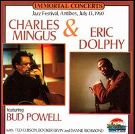 Black History Month at HurdAudio takes a turn toward one of the most amazing live recordings I've ever heard: Immortal Concerts: Jazz Festival, Antibes, July 13, 1960 by Charles Mingus and Eric Dolphy. This one is another must for the serious jazz collector.
Black History Month at HurdAudio takes a turn toward one of the most amazing live recordings I've ever heard: Immortal Concerts: Jazz Festival, Antibes, July 13, 1960 by Charles Mingus and Eric Dolphy. This one is another must for the serious jazz collector.These compositions are all Mingus, with the exception of the jazz standard "I'll Remember April." Though at this point many of these Mingus charts are standards in their own right. The band is Mingus on bass and piano, Eric Dolphy on reeds, Booker Ervin on tenor sax, Ted Curson on trumpet, Dannie Richmond on drums and Bud Powell sits in on piano for "I'll Remember April." This is one hot band and they were completely on for this set.
"Better Git Hit In Your Soul" opens this listening experience. There are few blues tunes more hip than this one. And this is one of the outstanding performances with Dolphy working an extended, outstanding solo through much of it. The rhythm section digs deep enough to draw out deeply sincere "hallelujahs" out of even the most cynical non-believers. Toward the end Mingus moves over to the piano after driving this performance as the band leader on the bass. He hits a few perfect chords before pulling back to the head as he returns to his ax.
"Wednesday Night Prayer Meeting" turns in another definitive take on a Mingus classic. Here Ted Curson weaves a near perfect solo line on the trumpet over the top of an irresistible blues groove. The dynamic range fluctuates organically so that loud passages come on with surprising impact in the wake of relative quiet. The bass seems to speak with emphatic humanity and the horn section responds in kind. Booker Ervin turns in a masterful solo. Drawing out sustained tones before sending out a cascading sermon of sound that pierces right through the harmonic qualities of this composition. The band takes on the feeling of a congregation swept up in the tone and mood of this performance. During the drum solo Mingus moves over to the piano and translates his role from the bass to the 88-keys for a dramatic change of timbre. Returning to the melody at the conclusion has rarely felt more satisfying after the journey this one lays out.
"Prayer for Passive Resistance" lays down a great interplay between the bass and drums as Dolphy comes in to lay down the melodic line on sax. Then Mingus starts his walk as Ervin is unleashed to explore this composition through inspired improvisation. Again, so much of this material derives so much from the variation in the dynamic range from the rhythm section from the tension of quiet to the release of loud. This composition and this performance is the spiritual definition of "prayer." The kind that has genuine passion and sincerity to it. The kind that is directed at deeper truths and hard won convictions.
"I'll Remember April" marks a change of pace as a showcase of the incredible talents of guest performer Bud Powell. This was a historic performance. A chance to hear one of the greatest jazz pianists of all time backed by a great band. Here Powell is given generous space to spin out an awe inspiring solo over some familiar chord changes. The rest of the band takes a series of shorter solos following Bud. The sequence of "trading 4's" between Ervin and Dolphy toward the end is particularly inspired. Particularly when the rhythm section drops away for a spell to leave them exposed. The ending is also a nice touch as a multilayered polyphony pairs away to a spare set of chords on the piano to conclude this amazing performance.
"What Love?" is a great Mingus ballad and a chance to hear Dolphy working his magic on the bass clarinet. Though Ted Curson's trumpet solo is also not to be missed on this one. And Mingus takes a great, extended bass solo as well. But it's Dolphy's effort on this one that marks the high point of this set. Mingus and Dolphy find a lot of open spaces to explore inside the framework of this composition and they make the most of it. The texture of acoustic bass and bass clarinet has never sounded better.
"Folk Forms I" marks a return to the impassioned sermonizing that kicked off this set. Mingus lays out a conversational line on the bass and is joined by a sax from the "congregation" as the drums fill in some punctuation marks in between. Slowly, the "congregation" fills out with an intoxicating bubbling of sounds and interweaving melodic lines. At times, things strip away as one performer after another bears their "testimony" in improvised form. But it's when the full ensemble kicks in that the ultimate release is found.


No comments:
Post a Comment